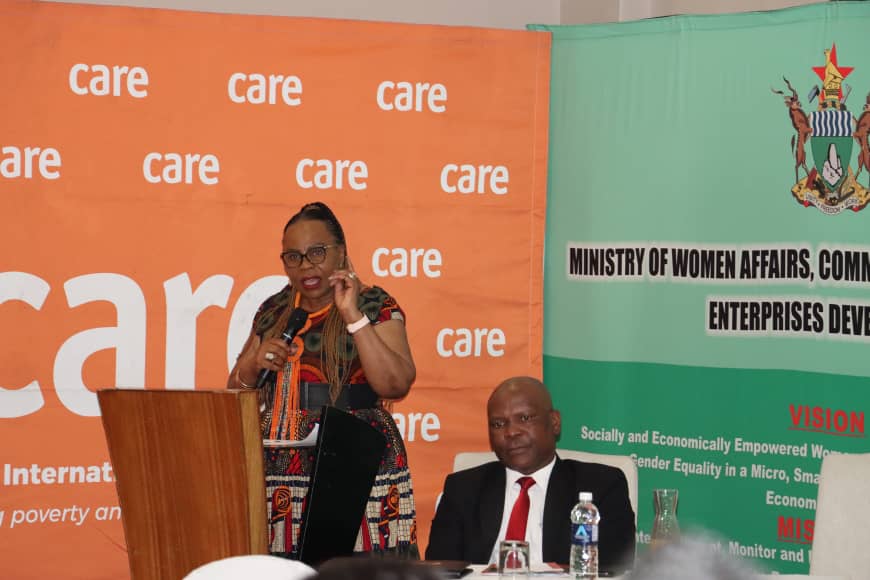|
Getting your Trinity Audio player ready…
|
Stakeholders are calling for gender-sensitive approaches to disaster prevention, mitigation and recovery strategies, and natural disaster assistance in pursuit of sustainable development.
This came to the fore today during a workshop titled ‘Gender and Disaster Risk Management’ a topical subject since the climate is changing and affecting everyone worldwide.
Addressing delegates, Hon Monica Mutsvangwa, the Minister of Women Affairs, Community, Small and Medium Enterprises Development said about 40% global population is now living with the harsh realities of climate change, high temperatures, drought, flooding, and many other extreme weather events and Zimbabwe has not been spared.
She said decreased agricultural production, food insecurity, poor health, scarcity of water and energy resources, climate-induced migration and conflict, and climate-related natural disasters are some of the challenges that are being aggravated by climate change.
Disasters, whether natural or man-made, have the potential to disrupt lives, destroy infrastructure, and cause immense suffering. They often exacerbate existing inequalities and disproportionately affect women, girls, men, and boys in different ways. However, it’s sad to state that the worsening impacts of such disasters lead to highly gendered impacts which largely affect women and girls. Violence against women and girls is also a factor during and post-disaster. Evidence shows that during the Cyclone Idai disaster here in Zimbabwe, more women than men reported losing their livelihoods and lives. During COVID-19, many women and girls faced GBV and teenage pregnancies.
Climate-induced disasters are now a reality and women and children carry the brunt of the impacts. Gender also intersects with other factors like disability, culture, religion, or socio-economic disadvantages, creating additional vulnerabilities and barriers to adaptation. These are likely to limit women in adopting effective strategies for preparing, adapting, and responding to disasters. It takes collaborative efforts such as this one to bring lasting change. Because of that, the Sendai Framework on Disaster Risk Reduction (2015-2030) states that gender should be integrated into all policies and actions.
“The Beijing Agenda for Global Action on Gender-Sensitive Disaster Risk Reduction (2009) calls for gender-sensitive approaches to disaster prevention, mitigation and recovery strategies, and natural disaster assistance.
“For Zimbabwe, we acknowledge that there is an urgent need for us to review and put in place the DRM Act, the Civil Protection Act, and a National DRR Plan which can be replicated at the local level. As a Ministry, we are committed to ensuring that our disaster risk management efforts are inclusive, equitable, and responsive to the needs of all people; integrating gender perspectives into our policies, plans, and practices, to address the specific vulnerabilities and capacities of women, girls, men, and boys,” Hon Mutsvangwa said.
She quoted Benjamin Franklin who says, “When the well is dry, is when we know the worth of water”. She urged stakeholders not to wait to see the well drying up by taking mitigation and adaptation measures.
The Minister lauded organizations like CARE International and UNDP for creating such platforms for joint efforts to scale up, support, and create spaces for women’s voices to be heard and ensure their active participation in decision-making processes during disaster planning, prevention, response, and mitigation.
She reiterated the Ministry’s commitment to ensuring available resources build the capacity of government actors at different levels and other key stakeholders to integrate gender perspectives into policies, plans, and practices that address the vulnerabilities of women and girls.
The ministry’s Permanent Secretary, Mr Moses Mhike, speaking at the same Gender and Disaster Risk Management Stock Taking Workshop, said that collaboration and partnerships are key to promoting gender equality and enhancing disaster resilience.
He noted that it is important for civil society organizations, the private sector, women’s groups, international agencies, and the government to share knowledge, resources, and best practices that can bring about inclusive gender transformative disaster risk mitigation strategies.
This workshop provided stakeholders with a unique opportunity to reflect on the progress made as a nation, the challenges encountered, and how to solve them.
It emerged that gender equality and disaster risk reduction are intrinsically linked, and there is a need for stakeholders to advance their understanding of this connection to build a more resilient and equitable world.
